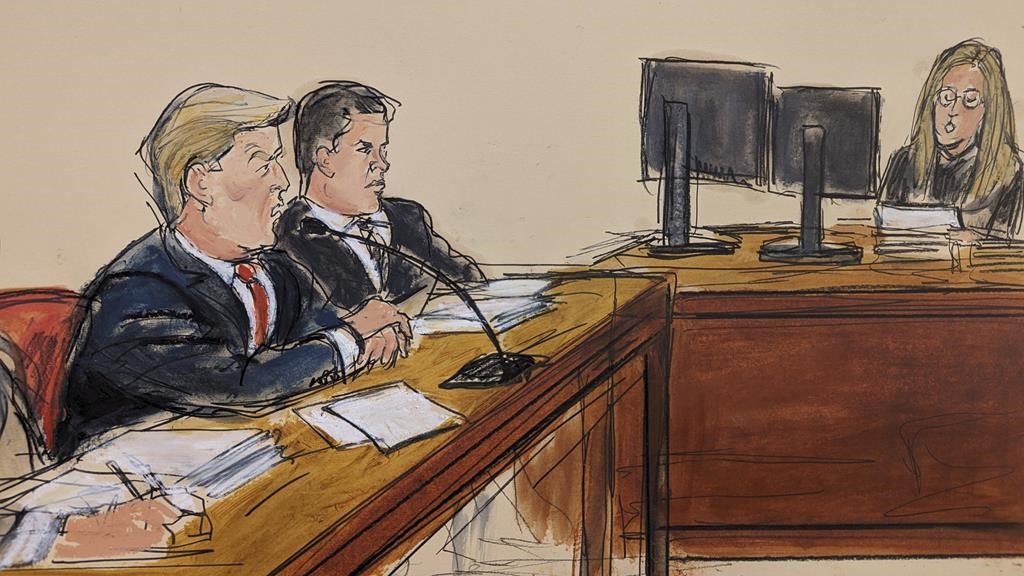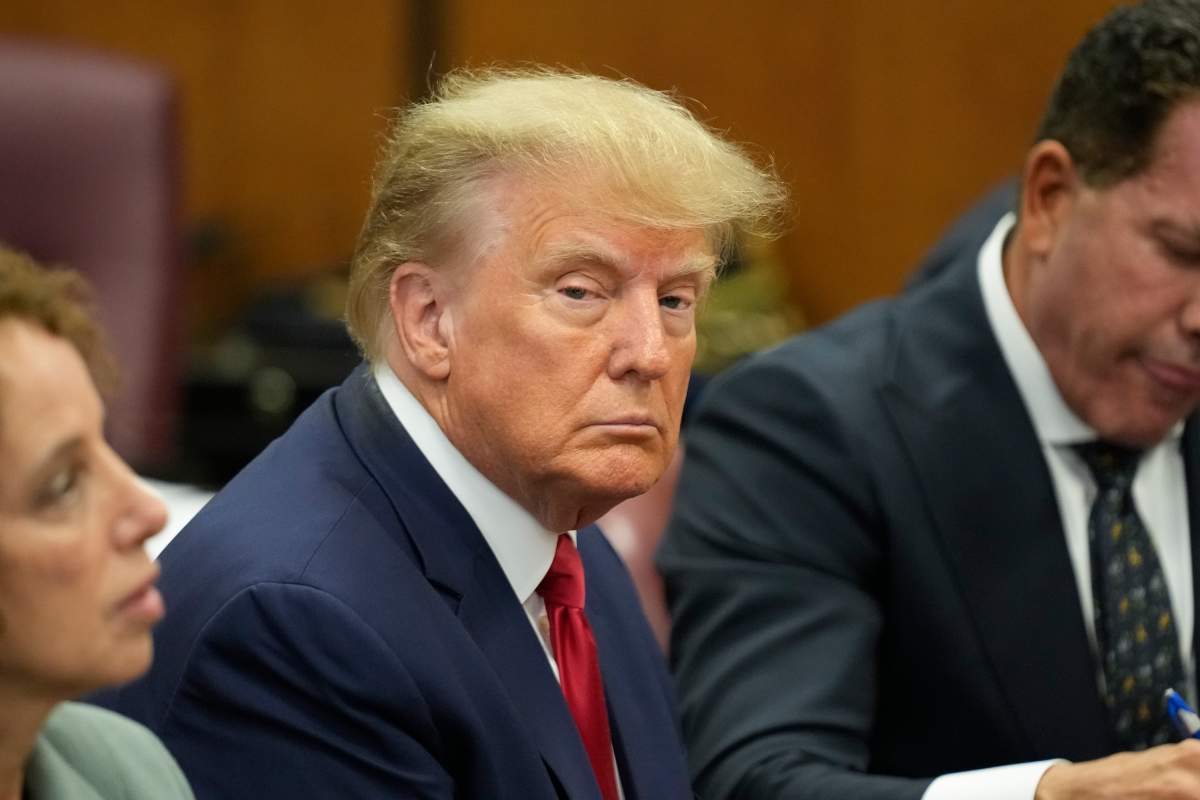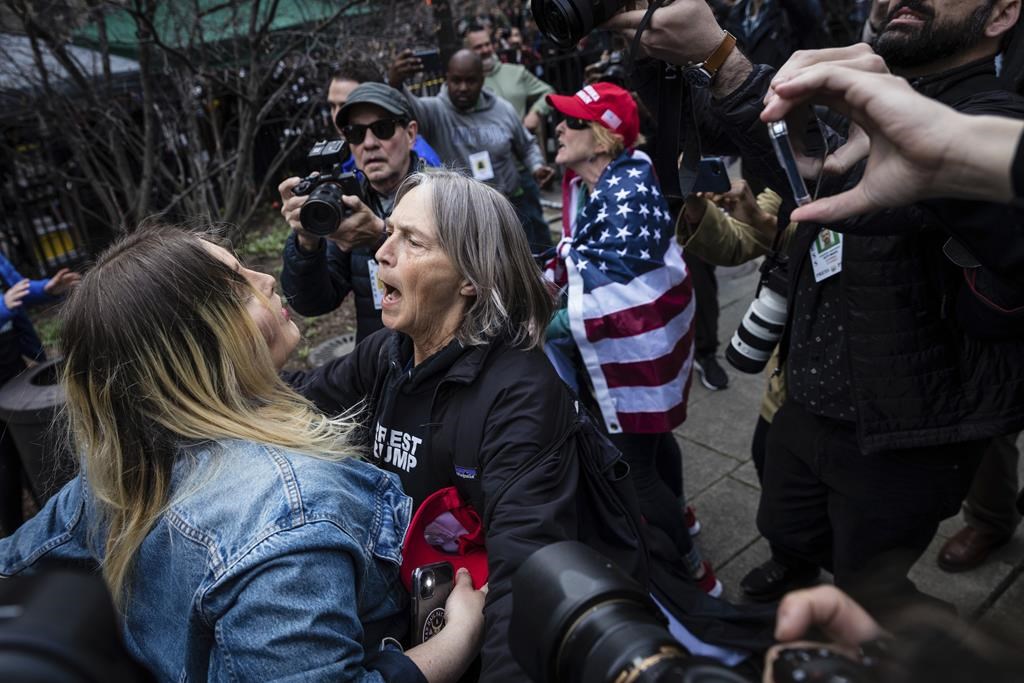Former U.S. President Donald Trump faced a judge in a New York City courtroom on Tuesday where he was formally arraigned on business fraud charges over hush money payments allegedly made to a woman who say they had sexual affairs with him.

He pleaded not guilty to 34 felony counts of falsifying business records, which were outlined in an indictment made public shortly after Trump’s appearance in court.
The indictment, approved by a Manhattan grand jury last week, accuses Trump of orchestrating “a scheme with others to influence the 2016 presidential election by identifying and purchasing negative information about him to suppress its publication and benefit” Trump’s electoral prospects.
It was an unprecedented moment in the history of the country. No former or sitting U.S. president has ever been charged with a crime.

It also marked a first for Trump himself, who has long been under legal scrutiny and is facing mounting pressures in other federal and state investigations, but has never before been criminally charged as an individual. His various businesses have faced criminal proceedings, including a conviction last December against the Trump Organization for tax fraud.
Trump showed little emotion as he entered the courthouse in lower Manhattan Tuesday afternoon, saying nothing. He sat stone-faced inside the courtroom, flanked by his lawyers, only breaking his silence to enter his plea, according to media descriptions from inside the room.
He described the situation as “SURREAL” on his Truth Social platform as he made his way from Trump Tower, where he had arrived the day before from his home in Florida, to the courthouse.
His legal team said they were ready to “fight this case” following the arraignment. Trump lawyer Todd Blanche told reporters that it was a “sad day for the country.”
“You don’t expect this to happen to somebody who was president of the United States,” he said.

No mugshot was taken and Trump was not put in handcuffs, but was considered under arrest upon his arrival, according to multiple media reports.
He left the courthouse less than an hour later and returned to Florida and his Mar-a-Lago resort, where he insisted the case should never have been brought while making a series of false claims about the 2020 election and past and ongoing investigations against him.

He also attacked Manhattan District Attorney Alvin Bragg and the judge overseeing the case, Justice Juan Merchan, who had earlier warned Trump to refrain from overheated rhetoric.

Get breaking National news
“The only crime I have committed is to fearlessly defend our nation from those who seek to destroy it,” he told a room full of supporters.
There has been speculation Trump is counting on the national and international attention from his indictment and arrest to boost his re-election campaign for president, which was launched last year.
His aides say the campaign had raised US$7 million since word of the indictment broke, but official figures have not yet been released.
Trump and several Republican supporters have accused Bragg, a Democrat, of having a political vendetta against the former president. Prosecutors have stressed their investigation had nothing to do with politics and that the grand jury that voted to indict him is unbiased.
“We cannot allow New York businesses to manipulate their records to cover up criminal conduct,” Bragg said in a statement announcing the indictment, which he said exposes a “trail of money and lies.”
“As this office has done time and time again, we today uphold our solemn responsibility to ensure that everyone stands equal before the law.”

What is Trump alleged to have done?
The case centres around hush money payments allegedly made to adult film actress Stormy Daniels, whose real name is Stephanie Clifford, and Playboy model Karen McDougal to keep their allegations of past sexual encounters quiet during the 2016 presidential campaign.
Falsifying business records is typically a misdemeanor in New York State but can be elevated to a felony if prosecutors believe they can prove it was done in furtherance of another crime, such as a campaign finance violation. Yet the indictment does not explicitly say what that crime may be.

Bragg later told reporters the alleged felonies violated New York election laws by conspiring to promote a candidacy through unlawful means.
Taken together, the charges carry a maximum sentence of 136 years in prison under New York law.
Trump has denied the affairs ever took place or that he knew about the alleged hush money payments.
The indictment and statement of facts allege Trump knew about a $130,000 payment made by his then-lawyer Michael Cohen to Daniels in October 2016, and worked out a deal to repay Cohen through the accounts of the Trump Organization throughout the course of 2017, hiding the payments to Cohen as legal fees and bonuses.
Each payment allegedly made to Cohen is treated in the court records as a separate felony count of falsifying business records.
Cohen was also allegedly involved in the $150,000 payment to McDougal, which was made by Trump friend and National Inquirer publisher David Pecker to obtain the rights to her story. The story never ran, a tactic known as “catch-and-kill.”

According to the indictment, that payment was part of a larger scheme worked out between Trump, Pecker and Cohen in August 2015 — two months after Trump announced his candidacy for president — to suppress negative stories about Trump during the campaign.
Pecker, a longtime friend of Trump, admitted he participated in the scheme in a 2018 non-prosecution agreement that granted him immunity in exchange for testifying against Cohen, who plead guilty to campaign finance violations and fraud that year over the payment to Daniels.
None of the charges against Trump relate to any of those other hush money payments. But Bragg’s office included details of the alleged scheme in the statement of facts to establish a pattern of behaviour for Trump that continued with the payment to Daniels.
Heightened security
Security in New York was heightened in the days leading up to Trump’s arrest. Supporters and counter-protesters squared off loudly near the courthouse, and throngs of media reporters sought to catch a glimpse of Trump’s arrival and departure.
Bragg’s predecessor, Cyrus Vance, as well as federal prosecutors have previously decided not to pursue the case against Trump to the point of laying charges, fueling speculation from Trump’s supporters that Bragg had resurrected the case for political purposes.
Bragg told reporters his office has received additional evidence since he came into office last year, but did not say what that evidence was.
Trump and his campaign have repeatedly assailed Bragg, calling him an “animal” and referring to the proceedings as a “WITCH HUNT” and a “KANGAROO COURT” in angry social media posts and fundraising emails. Last month, he called for his supporters to protest across the country as he teased his impending arrest.
In court on Tuesday Justice Merchan warned him to refrain from rhetoric that could inflame or cause civil unrest.
Trump faces other potential legal perils as he seeks to reassert control of the Republican Party and stave off a slew of one-time allies who are seeking or are likely to oppose him for the presidential nomination.
The district attorney in Atlanta has for two years been investigating efforts by Trump and his allies to meddle in Georgia’s 2020 vote count, and has said charges in that case are “imminent.” And a U.S. Justice Department special counsel is investigating Trump’s storage of classified documents at his Mar-a-Lago home in Florida and his efforts to reverse his election loss.
— With files from The Associated Press.












Comments
Want to discuss? Please read our Commenting Policy first.